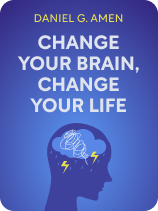

This article is an excerpt from the Shortform book guide to "Change Your Brain, Change Your Life" by Daniel G. Amen. Shortform has the world's best summaries and analyses of books you should be reading.
Like this article? Sign up for a free trial here.
Would you like to be more organized? Are you easily distracted? How can listening to Mozart help?
Your prefrontal cortex oversees your executive function. If it’s not hitting on all cylinders, you could experience difficulty with focus, directions, emotions, learning, managing daily life, and more. Dr. Daniel G. Amen discusses ways to identify and address prefrontal cortex dysfunction.
Read more to learn about the symptoms of—and treatments for—prefrontal cortex dysfunction.
Symptoms of Prefrontal Cortex Dysfunction
If you find yourself constantly battling distractibility, struggling with impulsivity, or feeling socially anxious in conversations, you might be experiencing prefrontal cortex dysfunction. These problems are consistent with the symptoms Dr. Amen identifies, including:
- Attention, focus, and time management issues—difficulty sustaining attention, impulsivity and procrastination, trouble listening, chronic lateness, and impaired short-term memory
- Social and emotional struggles—mood swings, misperceptions, poor judgments, difficulty expressing emotions and controlling behavior, poor social skills, and social anxiety
| Additional Contributors to These Symptoms Health experts identify other factors beyond prefrontal cortex dysfunction that may contribute to these symptoms. Being aware of these factors may offer a more comprehensive understanding of the nuances influencing these challenges. Attention, focus, and time management issues may stem from attention deficit hyperactivity disorder (ADHD), obsessive-compulsive disorder (OCD), or depression. Social and emotional struggles can result from bipolar disorder, depression, various physical ailments, or experiencing traumatic events such as childhood abuse. |
Repair and Optimize Your Prefrontal Cortex
Dr. Amen’s suggestions for repairing and optimizing your prefrontal cortex region include the following strategies:
Harmonize with Mozart: Dr. Amen explains that theta brain-wave activity is linked to increased distractibility and impulsivity. Listening to Mozart reduces this activity, enhancing focus and mood control and contributing to your prefrontal cortex functioning more effectively.
(Shortform note: Some researchers attribute the beneficial effects of listening to Mozart to the repetitive nature of his music. Mozart’s compositions typically feature repetitive melodic lines: Each harmonic tension resolves predictably, reducing elements that could distract the listener. Advocates of this theory suggest that the highly structured nature of Mozart’s music may mirror the cerebral cortex’s organization.)
Set daily goals: Recording and pursuing daily objectives steers your thoughts and behaviors and enhances prefrontal cortex functionality.
(Shortform note: An added benefit is that each time you achieve a goal, you’ll trigger the release of the neurochemical reward, dopamine. As a result, you’ll naturally associate feelings of satisfaction with the process of setting and achieving goals, and this will make it easier to adopt goal-setting as a long-term habit.)
Envision future consequences: Contemplating the potential outcomes of your decisions trains your prefrontal cortex to consider actions’ long-term repercussions.
(Shortform note: Gautam Baid (The Joys of Compounding) adds to this, specifying that you should make daily choices with a focus on their long-term impact on your health and quality of life, and avoid sabotaging behaviors that may harm your future well-being. For example, sticking to a budget will positively impact you in the long term by creating financial stability and alleviating stress, while habitual overspending might result in debt and heightened anxiety.)
Leverage organizational support: Using organizational tools and enlisting help from organized people refines your planning skills and elevates the effectiveness of your prefrontal cortex.
(Shortform note: You’ll benefit more from this strategy if you select tools that complement your natural tendencies. For example, if you process information better when you write it down, a paper-based system might suit you best. If you prefer digital solutions or your tasks require frequent updating, try using an app. If you process information better audibly, consider using a voice memo app. Additionally, choosing tools with sharing and collaboration features will make it easier to enlist help and solicit feedback from organized people.)

———End of Preview———
Like what you just read? Read the rest of the world's best book summary and analysis of Daniel G. Amen's "Change Your Brain, Change Your Life" at Shortform.
Here's what you'll find in our full Change Your Brain, Change Your Life summary:
- A more effective approach to overcoming physical, mental, and cognitive issues
- The four factors to nurture to improve your brain health
- Why listening to Mozart can enhance your focus and mood control






